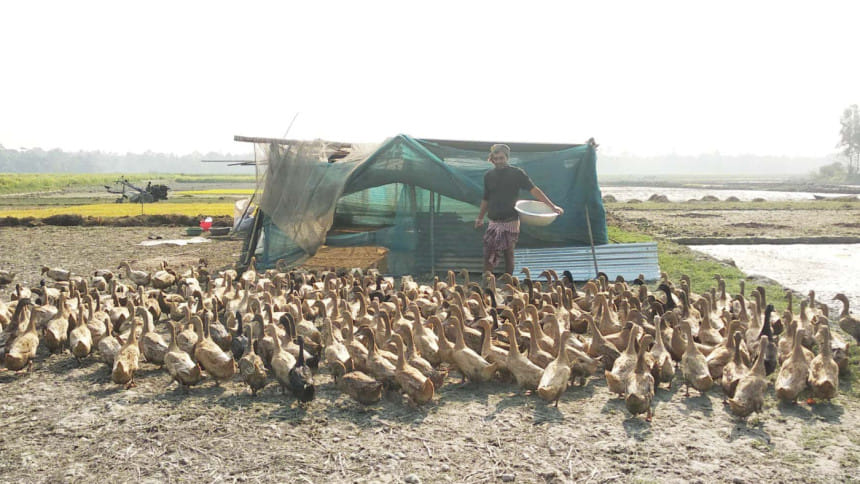Aminur’s cost-effective ‘mobile’ duck farm pays off

Aminur Rahman of Gachhpara Kamrangaon village in Tangail’s Delduar upazila has found a more profitable way of duck rearing, which requires him to shift the birds to a different place twice or thrice a year, depending on availability of water in waterbodies.
He started the farm with a thousand ducks around a year ago at a waterbody near his father-in-law’s house at Shikderbari village in the upazila.
“When the waterbody dried up after a couple of months, I shifted the ducks to a beel (waterbody) near my village home at Kamrangaon in Fazilhati union. A few days ago, I shifted those to the Dhaleswari river at adjacent Elasin union,” he said.
About a decade ago, Aminur, then engaged in wheat business, started buying a duck almost every day. The number of the birds later rose to 165 and Aminur realized that duck rearing would be a profitable business.
However, he closed his business and went to Saudi Arabia with a job. He returned after a couple of years as the income there was not satisfactory.
He later went to Singapore and worked there for a few years.
Over a year ago, Aminur returned to the country with a plan to start duck farming on a large scale.
He bought 1000 Jinding and Khaki Campbell varieties of duck chicks for Tk 35,000 and started rearing those at Shikderbari. Beside the waterbody, he made a makeshift structure, where he stayed and kept feed and vaccines for the ducks.
“Within four months, the ducks started giving eggs. I get 300 to 350 eggs from my ducks every day and sell it for at least Tk 1000 per hundred to local wholesalers,” he said.
“I have got around Tk 5 lakh by selling eggs in the last five months while I had to spend Tk 2 lakh during the period for running the trade,” he said.
“As my ducks eat natural foods from waterbodies, I don’t have to spend much for buying other feed, usually made with wheat dust, chaff and paddy, for them,” he said, adding that the price of his 1000 ducks is Tk 3 lakh.
Aminur’s wife Bipul Begum said she helps her husband in rearing the ducks. “I have received training on duck rearing for 38 days in two phases from the livestock department. I can provide primary treatment to the ducks of the farm,” she said.
“Now our family is running better than when my husband lived abroad for earning,” she added.
It will be easier for people, especially unemployed youths to engage in profitable duck farming if the livestock department provides them necessary training and arrange free vaccinations for ducks, Aminur said.
Appreciating Aminur’s ‘mobile’ duck farm, Dr Mohammad Ali, a veterinary surgeon of livestock department in Delduar upazila, said, “The department provides vaccinations, treatment facilities and suggestions for duck farms at the rate fixed by the government.”

 For all latest news, follow The Daily Star's Google News channel.
For all latest news, follow The Daily Star's Google News channel. 



Comments